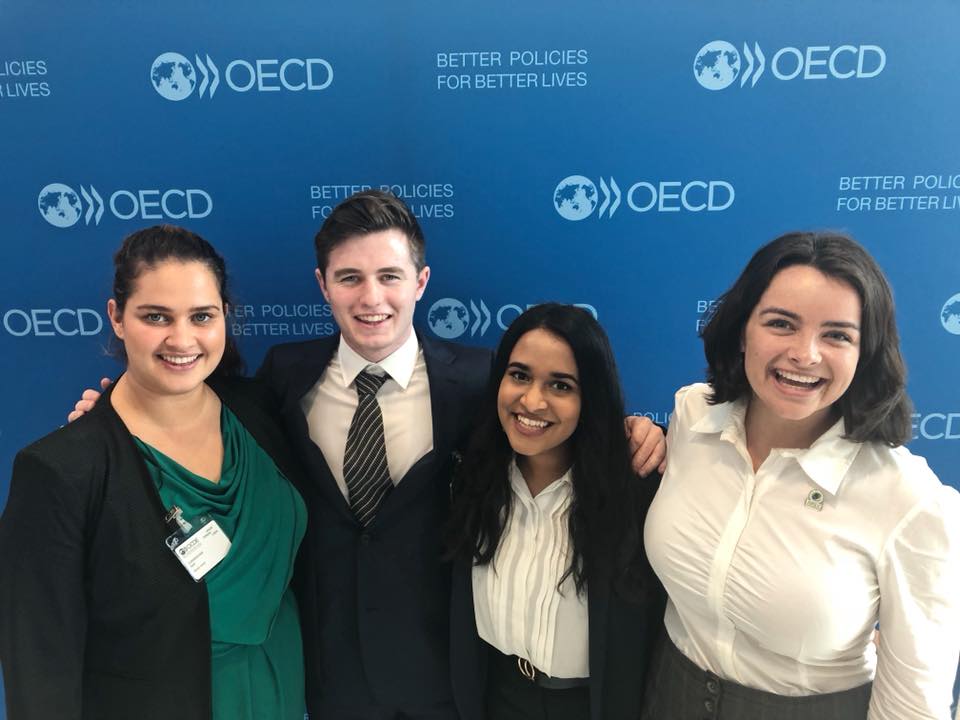Jack Dalrymple - on taking his voice to the OECD
By Seth Robinson
For most of us, institutions like the United Nations and the OECD exist in a sphere far removed from our day-to-day lives. In some ways, they seem impenetrable, and surreal, and for students chasing a future with one of these organisations, the path to their doors is far from clear. The Global Voices Scholarship gives students, like Jack Dalrymple, a chance to visit and connect with these organisations, fostering practical, hands-on experience for our future leaders.

Jack Dalrymple has always wanted to work in the not-for-profit sector. It was this, and a love of economics that led him to a Bachelor of Commerce at the University of Melbourne, for its versatility, and the options that it opened up for him.
“I thought Commerce was a good option because it’s a base for pretty much anything you want to do in life. It gives you a range of options that other degrees don’t, especially with the Melbourne Model, where they give you a broad understanding of a variety of sectors. I have friends doing the exact same degree as me who are going into finance and the banking sector.”
When the opportunity to apply for the Global Voices program arose – a not-for-profit that focuses on creating opportunities for practical experience in the fields of diplomacy, policy and advocacy – Jack was an eager candidate.
“I heard about Global Voice half way through last year, because they had another program running with the International Monetary Fund (IMF) and the World Bank. I did some research over the course of the following year, and I was just overwhelmed by what they do. Essentially, they partner with universities to facilitate youth delegation to international summits, including the IMF/World Bank, the World Health Organisation (WHO), and the Organisation for Economic Co-operation and Development (OECD)."

It was the latter of these programs that Jack found himself applying for and eventually accepted into, and as a recipient of the Global Voice scholarship, he was on his way to Paris, and the OECD.
“It was an amazing experience. It’s hard, there wasn’t any one stand-out moment, but a bunch of great stories and experiences that all added together. I think my favourite was a random meeting. I was having lunch at the OECD cafeteria and I ended up speaking with this gentleman behind me, we ended up having a two-hour conversation over lunch. He was Kenyan, but he’s been living in Scotland for the last 20 years, where he’s been working in Scottish and African race relations. He went on to talk about the African-American experience of slavery, and all of these other issues which I had never experienced or educated myself on, growing up in Australia.”
Now, Jack is working on the final part of the Global Voices experience, a research proposal, about bridging the divide between big businesses and small businesses, when it comes to digitalisation. “There’s currently a big gap in what large businesses can do when they take on digital technologies, and what small businesses can do.

What we find is that whenever a business gets involved with social media promotion, there’s pretty much a universal guarantee of higher sales, higher revenue, and higher profits overall. But a lot of small businesses don’t seem to invest in digitalisation and take up those benefits, so they’re falling behind larger businesses that can put the resources behind it.
There are other issues as well, such as access to the internet. On average, 53% of customers will only spend about three seconds waiting for a website to load, but an average Australian business’s webpage will take twenty seconds. They lose customers before the website has even loaded,” he says. “A big part of it is about seeing what the government can do – a lot of the time it’s private sector organisations that try to help businesses with digitalisation, but nothing is standardised. There needs to be a streamlined system, so small business managers can find information easily and know it’s something they can trust.”